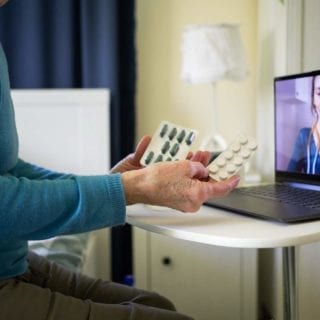
The COVID-19 pandemic threatens cancer patients with complications and serious illness.Mesothelioma cancerpatients are among those who may develop life-threatening complications from the coronavirus. In order to provide safe treatment and care, telemedicine has become an important tool for healthcare providers.
Telemedicine allows patients to connect with healthcare professionals by phone or video. Virtual care keeps patients out of high-risk areas and slows the spread of coronavirus. Mesothelioma patients should discuss how to integrate telehealth into their healthcare plans with their doctors.
How COVID-19 Is Affecting Mesothelioma Care
More than three million people around the world have been diagnosed with the novel coronavirus. The virus attacks the lungs, making patients with respiratory or lung conditions vulnerable, including those withpleural mesothelioma。Patients undergoing cancer treatment may also have weakened immune systems, making them more susceptible to severe COVID-19 complications.
There is currently no vaccine to protect against COVID-19. According to the Centers for Disease Control and Prevention (CDC), social distancing and maintaining good hygiene are the best ways cancer patients can protect themselves against exposure.
The CDC also states individuals who are not showing symptoms could be asymptomatic and infect healthcare workers or patients. Limiting appointments and procedures keeps infected patients out of healthcare spaces. This can help prevent the virus from spreading to others.
How Telehealth Can Help Mesothelioma Cancer Patients
癌症患者多达possib应该呆在家里le tolower their risk of coronavirus and serious complications。由于COVID-19,远程医疗已经成为惩罚学生rtant tool for high-risk cancer patients. The use of technology to connect patients and healthcare providers allows cancer patients to decrease their risk of contracting the virus.
万博专业版Mesothelioma癌症患者应与他们的医疗保健提供者有关可用的远程医疗服务:
- Non-essential doctor visits
- Routine check-ups
- Refilling prescriptions
Telehealth allowsmesothelioma doctorsand their patients to safely discuss treatment plans and test results.
Aside from limiting community exposure, doctors are seeing moreadvantages of telemedicine emerge。Patients have increased access to specialized doctors and less commuting and waiting time.
Doctors are also more protected and can reserve in-person care for patients with the highest need. For oncologists, this may mean patients in the midst ofcancer treatmentor those involved in life-saving clinical trials.
The Use of Telemedicine in Ongoing Cancer Clinical Trials
According toa recent statement from the National Cancer Institute (NCI), healthcare systems may have limited resources to devote to clinical trials during the pandemic. In some cases, the NCI suggests studies addressing life-threatening cancers should continue to enroll and treat patients in clinical trials.
Although somemesothelioma clinical trialshave paused enrollment at this time, others continue to treat and monitor patients. Mesothelioma patients should talk with their health care team about their individual case and how to move forward withexperimental treatments。
Both the NCI and the Food and Drug Administration (FDA) have released guidelines on how clinical trials should proceed during the pandemic. These administrations recommend researchers conduct virtual visits when possible.
Guidelines from the NCIalso recommend using technology to coordinate with local healthcare providers. This means doctors should work with local laboratories and imaging centers to monitor patients. These partnerships would help limit travel.
The FDA also recommendedsponsors make protocols more flexible and change processes to incorporate telemedicine when possible.
The Cost of Telemedicine
Some patients may be concerned with the costs associated with telehealth. The government and private insurers are working to make telemedicine more accessible and affordable.
As of March 6, 2020,Medicare will temporarily pay for doctors to administer telehealth servicesfor patients in the United States. This means patients on Medicare can check in with their physicians without additional cost.
In the past, Medicare only covered the use of telemedicine for certain eligible patients. For example, Medicare previously covered telemedicine for patients in rural areas with minimal access to cancer centers. Any prior limitations will be lifted during the emergency period.
Additionally, some health insurers are offering incentives for telemedicine use. Insurance companies like Aetna, Blue Cross Blue Shield Association and Fidelis Care are expanding telehealth services and waiving copays for recipients. Because not every primary health provider offers telehealth services, some health coverage providers, like Fidelis, are also working with Teledoc to provide treatment online. To learn more, check outFidelis Care的Facebook页面。
By cutting out-of-pocket costs, insurers are encouraging patients to access care from their homes as much as possible. Mesothelioma patients should contact their insurer about telehealth coverage.
Telehealth After the Pandemic
The sudden rise of COVID-19 made the world quickly shift to telehealth. Online services and virtual appointments are keeping patients out of high-risk areas like crowded waiting rooms. Doctors have noted telemedicine is an effective way to keep cancer patients safe from viruses and germs.
Expanding telehealth services now is likely to have an impact on cancer care after social distancing ends. Doctors and healthcare officials are noting the advantages, drawbacks and potential improvements of virtual care. As the United States healthcare system moves towards a new normal, the use of telemedicine is expected to increase.





